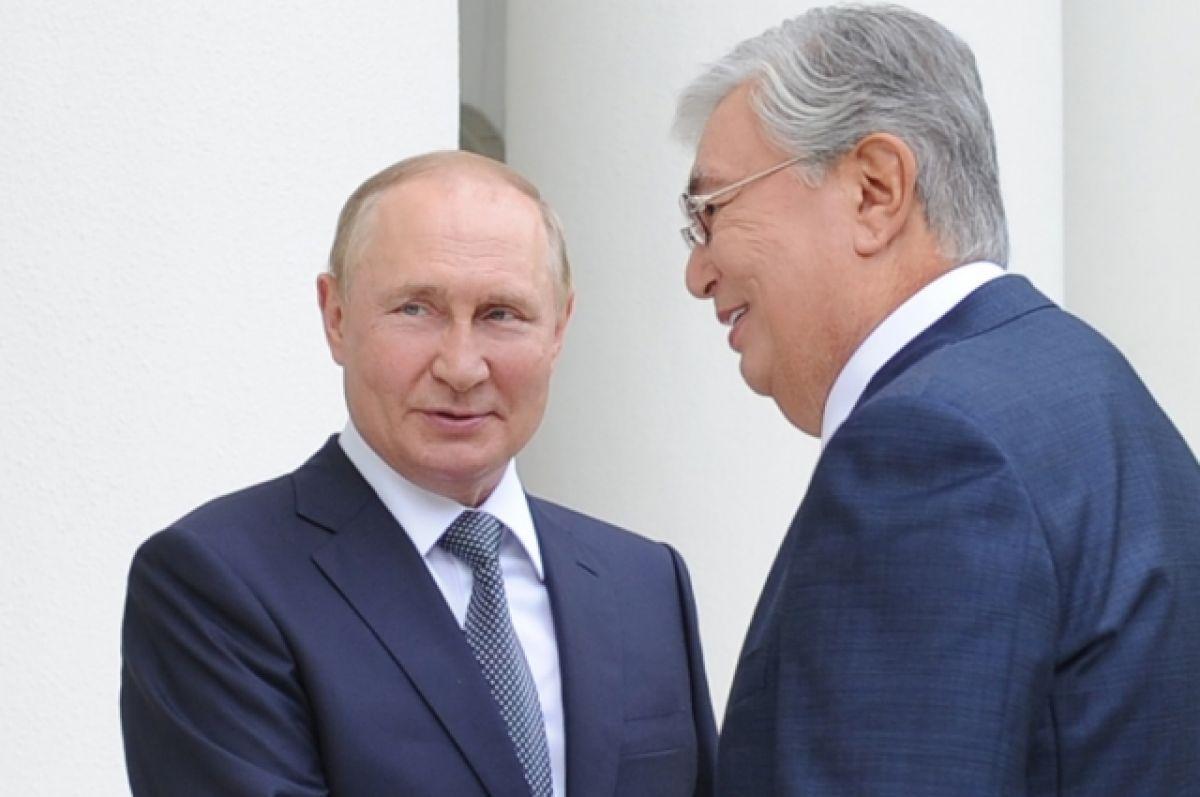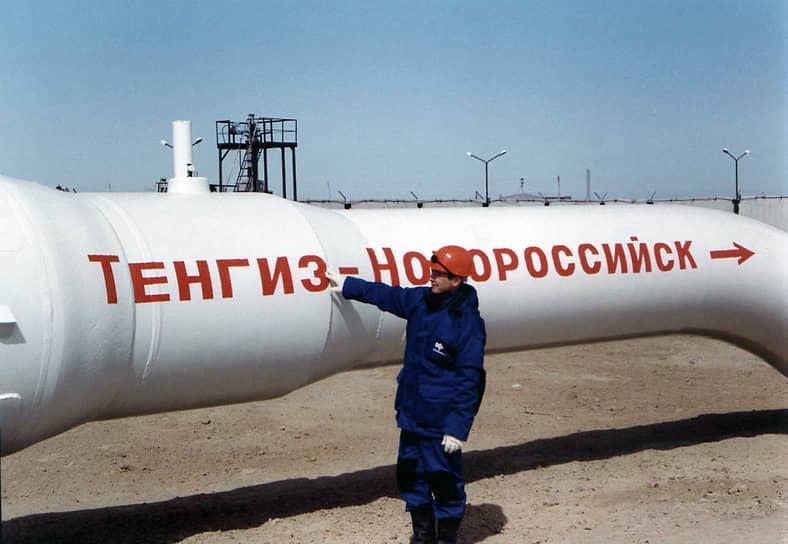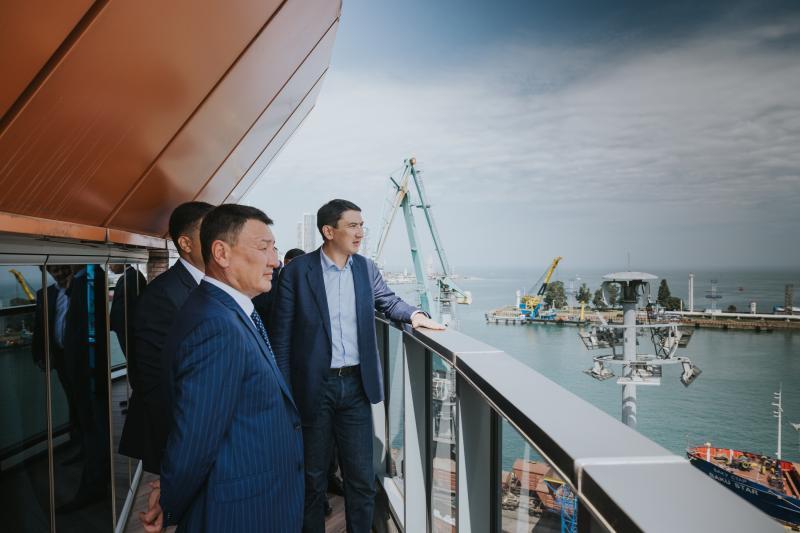Investing for the future: Can the Azerbaijani projects of the late 1990s help Kazakhstan? Serhey Bohdan's scenario
On August 25, the President of Kazakhstan Kassym-Jomart Tokayev visited Azerbaijan. The event took place amid chronic problems with Kazakh oil exports via Russia. However, cooperation between the two countries is not confined to solving Kazakhstan's aggravated problem of access to world markets. The new realities of global politics have given new weight to the infrastructure projects initiated by Baku back in the 1990s, in which their global aspects are becoming more and more noticeable. The South Caucasus may open up in the Asian direction and Central Asia - in the European direction.

Does Kazakhstan violate CSTO/EAEU unity?
The Kazakh leader arrived in Baku after his August 19 meeting with Putin in Sochi, which was probably his last attempt to negotiate with his Russian counterpart. Russian commentators noted that there were all signs of an unwillingness to talk on the part of the Kremlin. For his meeting with Tokayev Putin sent not even the governor but the deputy governor of Krasnodar Krai and the mayor of Sochi, and the meeting itself was extremely short - only two and a half hours. However, the most obvious evidence of the meeting's results was the fact that on August 22, "due to damage", the main route of export supplies of Kazakh oil - through Russia — was again partially and indefinitely (they said that for two months, and maybe until spring) decommissioned. This has happened for the fourth time since the beginning of the Russian invasion of Ukraine.
Russian experts have started talking about the possibility of diverting Kazakh oil to other Russian pipelines. But on August 25, President Tokayev headed to Baku, which has its own oil and gas export routes. Straight away it turned out, that breakages in Novorossiysk, may not seriously affect the flow of Kazakhstani oil.
The Kazakhstani leadership came to Azerbaijan not just to "extinguish the fire", but clearly thoroughly thought over this step - a package of documents indicates that Nur-Sultan prepared long ago to respond to endless ultimatums of the Moscow partners, and especially "damages" of the Russian pipe (which deprive the country of its main income) and negotiated with Azerbaijani partners. Indeed, during the Kazakh leader's visit to Baku, the signing of ten documents was announced - from the Declaration on Strengthening Strategic Relations and Deepening Allied Interaction and the five-year Comprehensive Cooperation Development Programme to sectoral cooperation plans and memoranda.
The President of Kazakhstan also very clearly supported Azerbaijan's restoration of its territorial integrity, and again stressed this aspect when speaking of the merits of President Aliyev: "We are observing these trends in your country, we are sincerely delighted. We also see how dynamically Karabakh and Eastern Zangazur are reviving". During the visit, a protocol for the establishment of twinning relations between the cities - Kazakh Turkestan and Azerbaijani Shusha were signed, and the government of Kazakhstan will build an art school in Fuzuli by the end of next year. For some reason, this position of Kazakhstan is causing discontent in some Armenian radical circles, saying that it is not appropriate for Kazakhstan, as an ally in the CSTO and the EAEU, to do so.
But the CSTO and EEU members both together and separately have never agreed to support Armenian nationalist projects or move borders. And not only Armenian ones. The Kremlin's separatist and expansionist projects of the same kind have not been officially recognised by any CSTO or EAEU country (including Belarus).
As a matter of fact, at the recent St. Petersburg International Economic Forum on June 17, Tokayev spoke of Kazakhstan's commitment to the principle of maintaining modern world borders and its refusal to recognise Kosovo, Taiwan, Ossetia, Abkhazia, and the quasi-establishments of Donbas.

Will Azerbaijan help Kazakhstan "to open a window to Europe"?
Despite the close political relations between Baku and Nur-Sultan, economic achievements are more modest. Last year, the volume of trade tripled, totalling $330 million. The problem was primarily due to the structure of the economies of both countries, which in recent decades have developed primarily the oil and gas sector and related industries, in some sense duplicating each other.
However, the events of recent years, associated with the escalating global confrontation of the West with Russia and the United States with China, have seriously changed the geo-economic position of Azerbaijan and Kazakhstan. If both countries manage to strategically dispose of new opportunities, the volumes of interaction will soon begin to grow at a rapid pace. In this new environment, what was previously a problem - having a similar economic structure based on the oil and gas industry - is becoming a major point of interaction - as both Baku and Nur-Sultan have to find a strategy to bring their hydrocarbons to world markets in the face of growing global conflict. In addition, both countries are seeking ways to diversify their economies and ensure food security.
A primary concern is the issue of transit and exports, which is most acutely faced by Kazakhstan, situated deep in the Asian continent. Against the background of new transportation problems via Russia and old transportation problems via Iran, Azerbaijan was a logical solution. As a consequence, in January-July this year the volume of freight traffic from Kazakhstan through the port of Baku grew 3.2 times compared to the corresponding period of the previous year, reaching nearly one million tonnes.
Already in early March, Kazakhstan's railways faced the fact that it had become impossible to deliver cargo through the territory of the Russian Federation to ports on the Baltic Sea and the Black Sea. Nur-Sultan then turned again to the idea of developing the Trans-Caspian International Transport Corridor (TMTM). TMTM is an international transport corridor that connects China and European countries via Kazakhstan, the Caspian Sea, Azerbaijan, Georgia, and Türkiye. It also includes the Baku-Tbilisi-Kars railway, and while TMTM was not seriously considered for hydrocarbon transportation, it was a route for containers, bulk cargoes, etc.
The main intrigue at present relates to the possibility of Kazakh oil exports via the TMTM through Azerbaijan. Solving this problem will have implications not only for strengthening the political and economic foundations of Kazakhstani statehood but also for Nur-Sultan's (and Baku's) relations with Moscow. The right choice of means and ways to achieve both goals will be of the utmost importance for Azerbaijan, Kazakhstan, and the entire region. Unfortunately, it will not be easy to do - as experience shows, in response to their attempts to adapt to the new international situation the great power has too often put Nur-Sultan in front of the facts that threaten the very basis of Kazakhstan's economy.
It is hardly possible to agree with the claims against the Kazakhstani side, as they say, profiting from the situation created by the Russian invasion of Ukraine. The Kazakhstani authorities are changing their foreign economic strategy, as the country needs to survive and develop. Right, amid confrontation between EU and RF and the EU embargo on coal supplies from Russia imposed in August, Kazakhstan supplied 1.5 million tons of coal to the EU in January-May, which is almost twice more than for the whole of 2021, but it is a drop in the ocean in the energy balance of Western countries, no matter how much Moscow newspapers hyping on this fact. The situation did not look so clear-cut with regard to the dynamics of oil and gas production (before the problems with the CPC became chronic.) In June, OPEC, in its report, described Kazakhstan as one of the "main drivers of growth" of oil supplies to the world markets among the countries that are not members of the union. However, Dauren Karabayev, deputy chairman of KazMunayGas, said Thursday that oil production, including KMG's share in major projects, was 10.7 million tonnes in January-June, up only 0.3% from the first half of 2021. Gas production increased by 0.8% to 4.1 billion cubic metres.
Despite this restrained line, Kazakhstan has had problems with export deliveries, for which it has relied on Russia. Until now, the main export route for Kazakh oil has been the Tengiz-Novorossiysk pipeline, with subsequent loading onto ships for transportation by sea. The Caspian Pipeline Consortium (CPC) owns this infrastructure with a capacity of 67 million tonnes of oil per year. It exports more than two-thirds of Kazakhstan's oil abroad.
Things could go on like that, but recent events make it unlikely that they will go back to square one. It is hard to accuse Kazakhstan of looking for trouble with the Kremlin. Just a month after the start of the Russia-Ukraine war, on March 23, the first breakdown at the Novorossiysk terminal of the CPC 'occurred'. Actually, the main steps of the Kazakh authorities in search of alternative routes for oil exports and interaction with the outside world took place in response to these curious mishaps at the CPC. During a visit to Türkiye in May, Tokayev publicly announced that he had begun "to diversify oil export routes to China and Europe, including through Turkish transport corridors. Work has begun on increasing the capacity of oil pipelines and upgrading the Aktau and Kuryk seaports."
In response, Kazakhstan received no proposals for a compromise regarding the Russian pipeline, instead, it got an "unscheduled on-site inspection" of the CPC in Novorossiysk on May 6, according to the results of which the consortium was issued an order to eliminate violations by November 30. At the same time, for some reason, an administrative offence report was drawn up, and then "mine clearance" began in the waters of the pipeline's offshore terminal on June 15. As a result, on June 19, Russia first reduced and then stopped transportation of Kazakhstani oil through Novorossiysk port, actually cutting off a vital source of income for the brotherly post-Soviet country.
Then, on July 4, Kazakh President Tokayev had a telephone conversation with EU President Charles Michel, and assured the latter that Kazakhstan was "ready to use its hydrocarbon potential in order to stabilise the situation on world and European markets". In addition, Kazakh President Tokayev formally instructed state-owned KazMunayGas to work out options for developing the TMTM to diversify its oil supplies. Alas, this and the warning from Kazakhstan were not heeded either. In response, its partners escalated, and a Russian district court stopped the work of the CPC for a month (although, later, on July 11, the decision was overturned).

It should be stressed that amid continued problems with exports from the CPC, Nur-Sultan made it clear that they did not want to challenge the Kremlin in a situation when the latter's game with reducing and interrupting energy supplies to Western countries has become an important element of foreign policy and even waging war. In any case, Kazakh Energy Minister Bolat Akchulakov said as early as August 3 that his government was looking for ways to diversify its oil supplies. He linked this to the expected growth of oil production by the middle of 2024 (up to 103 or 107 million tons from 85.7 million tons this year) and assured that CPC would remain the most economically profitable route for Kazakhstani oil export and that Nur-Sultan sees its main goal in maintaining "uninterrupted operation" of this route.
But it has been difficult to rely on the mercy of Russian partners. On 12 August Reuters reported on Kazakhstan's intention to export part of its oil (1.5 million tonnes) through Azerbaijan's Baku-Tbilisi-Ceyhan pipeline starting in September, and talks with the Azerbaijani state company SOCAR. It was also reported that starting next year, another 3.5 million tonnes of Kazakh oil will flow annually to world markets through another Azerbaijani pipeline to the Georgian port of Supsa.
All these reports, of course, can be regarded as rumours, but it is a fact that on August 16, Magzum Mirzagaliyev, head of the Kazakh national oil and gas company KazMunayGas, met with Rovshan Najaf, head of the Azerbaijani state company SOCAR, in Baku to discuss the interaction between the companies in the sphere of trans-Caspian infrastructure development. On August 25, the Deputy Chairman of the Board of Kazakhstan's oil and gas company KazMunayGas, Dauren Karabayev, said that Kazakhstan was considering the possibility of using both pipelines that Azerbaijan has - Baku-Tbilisi-Ceyhan and Baku-Supsa to transport its oil. In the long term, he said, Nur-Sultan has alternative routes for exporting volumes quite comparable to those of the CPC. Moreover, he said, "discussions with the Azerbaijani side on the possible transportation of Kazakh oil are taking place at various levels, including at the state level, including at the level of national companies".

Roads as a strategy
The Kazakh president's recent visit to Baku shows just how far some post-Soviet countries have advanced compared to previous times. Kassym-Jomart Tokayev has served in various top governmental positions in Kazakhstan since the early 1990s and has much to compare the present situation with. At a meeting with President Ilham Aliyev, he remarked: "I remember those times, and you remember when there were problems between our countries in the 1990s, which from today's point of view seem so small, so insignificant... I remember we were discussing the $8 million debt problem. There was such a problem, remember?".
Here, it remains to add that the current opportunities for interaction between Azerbaijan and Kazakhstan are associated with strategic projects to build infrastructure for interaction with the outside world and energy exports, which were initiated by Baku in the difficult 1990s when it was very easy to remain at the level of disputes "about eight million" mixed with stories about ancient greatness - as did many nationalist politicians. But the Azerbaijani leadership decided to build a new infrastructure for a future, most notably the Baku-Tbilisi-Ceyhan oil pipeline, which broke Moscow's monopoly on supplying the West with raw materials from post-Soviet countries. Interestingly, these decisions were linked to Heydar Aliyev, who at one time was responsible in the Soviet government for the construction of the giant Baikal-Amur Mainline and even opened it.
Today, we see the logical results of a policy that went far beyond Azerbaijan itself and is beginning to influence the new contours of entire regions. After all, if Azerbaijan and Kazakhstan can build new communications - not against Russia or anyone else - but within the framework of inclusive international cooperation, it cannot but affect neighbouring states as well. Thus, the leadership role of Azerbaijan and Türkiye in transforming the South Caucasus for the benefit of all its peoples will be boosted through integration with Central Asia.








